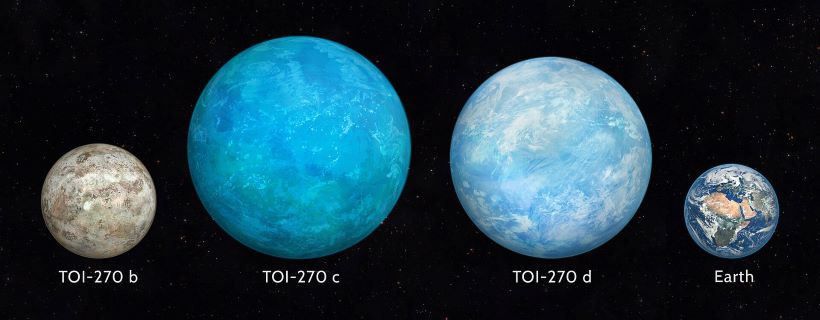Could a waterworld 70+ light-years away harbor life?
Astronomers working with NASA’s James Webb Space Telescope (JWST) have identified a distant exoplanet that may be entirely covered by a vast ocean, a discovery that pushes forward the search for habitable environments beyond Earth.
During the observations, the scientists detected water vapor, along with chemical signatures of methane and carbon dioxide in the planet's atmosphere. located about 70 light years away, is twice the size of Earth.
The exoplanet, called TOI-270 d, is a Neptune-like exoplanet that orbits an M-type, red dwarf star. With a mass of 4.78 Earths, it takes 11.4 days to complete one orbit of its star, and is 0.0721 astronomical units from its star TOI-270. Discovered in 2019, TOI-270 d is about 70 light-years away from Earth.
More to read:
Exoplanet K2-18b may harbor life
According to researchers from the University of Cambridge, these findings – published in the journal in Astronomy and Astrophysics Letters – suggest the planet could be a "water world" with a global ocean and a hydrogen-rich atmosphere. However, they caution that it’s unlikely to be a serene, Earth-like seascape.
The ocean could be as hot as 100 degrees Celsius or more but under high atmospheric pressure such an ocean could remain liquid, at least for a while, the Cambridge team claimed. As the planet is tidally locked to its host star, there may be regions that support life, for example at the border where day and night cling.
Their conclusions are contradicted by a group of Canadian researchers, who affirm that TOI-270 d is far too hot for liquid water, with surface temperatures possibly reaching 4,000 degrees Celsius. They propose the planet may have a rocky surface beneath a dense atmosphere of hydrogen and water vapor. Whether any biological forms of life can survive under these conditions is a big question.
More to read:
JWST spots large planets free-floating in space
The evidence supporting TOI-270 d’s ocean is based partly on the absence of ammonia in its atmosphere, which would typically be expected in a hydrogen-rich environment. Ammonia is highly soluble in water and would likely be absorbed by an ocean, reducing its presence in the atmosphere. This is why the Britons interpreted the data as evidence of a water-covered planet with a hydrogen-rich atmosphere.
Conditions on TOI-270 d are very different from those on Earth. Given that the planet is tidally locked, with one side perpetually facing its star while the other remaining in darkness, it exibits extreme temperature differences. The ocean would be extremely hot on the day side, but on the night side it could potentially experience habitable conditions, the first team suggests.

The planet would experience crushing atmospheric pressure, with steam rising from the ocean, which might be tens to hundreds of kilometers deep, resting on a high-pressure ice seabed atop a rocky core.
However, the scientists from the University of Montreal, who also studied the planet, questions the "ocean world" hypothesis. They argue that temperatures on TOI-270 d are likely too high for liquid water to exist. Instead, the Canadians suggests the planet's atmosphere might contain large amounts of water vapor, with surface temperatures reaching around 4,000 degrees Celsius. This would create a supercritical state for water, where the distinction between liquid and gas blurs, forming a dense, hot fluid.
More to read:
Scientists offer new evidence of 9th planet in Solar System
Both teams observed the presence of carbon disulfide, a chemical linked to biological processes on Earth but also produced by other means. On the other hand, they found no trace of dimethyl sulfide (DMS), another molecule associated with life.
The star TOI-270 is also orbited by a rocky planet coded TOI-270 b and another Neptunian planed called TOI-270 c. TOI-270 d is the farthest of the three from the star.
So, the question whether TOI-270 d harbors life remains open for scientific debate and the JWST will stay tuned to this planetary system for more observations.
***
NewsCafe relies in its reporting on research papers that need to be cracked down to average understanding. Some even need to be paid for. Help us pay for science reports to get more interesting stories. Use PayPal: office[at]rudeana.com or paypal.me/newscafeeu.







